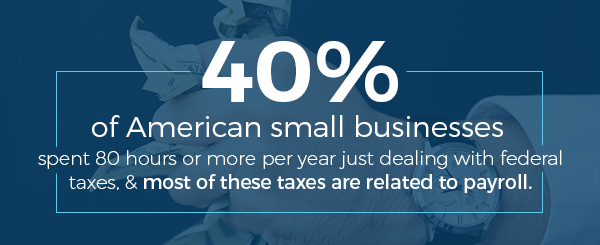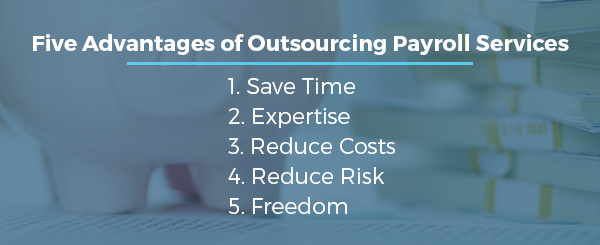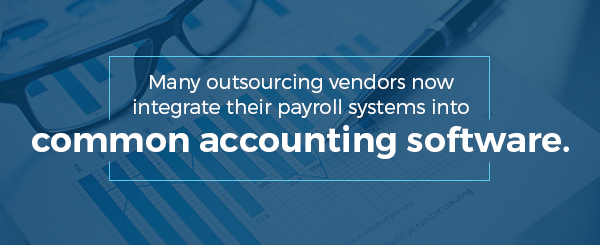The Many Reasons to Outsource Payroll Services
The National Small Business Association’s tax survey found that 40 percent of American small businesses spent 80 hours or more per year just dealing with federal taxes, and most of these taxes are related to payroll. When asked to rate the most pressing burdens on their business, 53 percent responding to the previously mentioned NSBA survey cited administrative burdens. Fulfilling administrative burdens such as payroll processing and related taxes takes up a great deal of a business owner’s time.
With so many reasons to move payroll processing off of their plates and to an offsite vendor, why do many businesses still cling to the traditional method of issuing payroll from their own administrative or accounting office? Many companies hold mistaken beliefs about costs, benefits and liabilities related to outsourcing the payroll function.
There are many advantages of outsourcing payroll services. The advantages, in fact, far outweigh any perceived drawback for almost every company.
Why Businesses Should Outsource Payroll
There are very few businesses that cannot benefit from outsourcing payroll. A small business with few employees and a relatively low employee turnover may be quite capable of handling its own payroll internally.
Most small businesses, however, see high employee turnover. They hire seasonal workers, part-time workers, or college students who change jobs frequently. Restaurants, bars, retail stores and similar businesses also experience high turnover. This can make setting up and managing payroll difficult and time-consuming for the person or department in charge of payroll paperwork and taxes.
Mid and large-sized businesses too often have high volumes of paychecks to issue, as well as other paperwork to process that can make handling payroll a full-time job. They may be better served by outsourcing payroll to a company that has the expertise needed for the task.
Five Advantages of Outsourcing Payroll Services
If you’re considering outsourcing payroll services, there are five main advantages to your business. These include:
- Saving time: Depending on the number of employees you have and the complexity of your company’s payroll, you could spend anywhere from 10 to 20 or more hours a week doing nothing but handling payroll. Tallying up hours, calculating benefits, entering the information online and filing the correct federal and state paperwork can be quite time-consuming.
There are also times when something unexpected occurs that can add even more hours to calculating payroll each week. And since you can’t exactly tell your employees, “Sorry, I’ll pay you next week,” payroll has to take precedence over other activities, which can curtail the time available to run the rest of your business. Companies that outsource their payroll find the time savings to be of enormous benefit.
- Expertise: The rules regarding taxes, social security payments and so on seem to change every year. Payroll companies become experts at handling all of the paperwork for various government bodies. They can ensure compliance and help you avoid costly penalties and fines for making mistakes. Their expertise can also help you minimize costs while ensuring employees receive the best service.
Most companies can benefit from this expertise because they simply don’t have the time to keep up with changing payroll regulations. Your payroll processing company can keep up with them because processing payroll is their area of expertise. You can concentrate more on what your company does best.
- Reduce costs: Another advantage of outsourcing payroll services is the ability a payroll provider has to reduce costs. Although you do have to pay someone to manage your payroll for you, this payment may be offset by the cost savings obtained by accurate record-keeping. Many small businesses fail to keep accurate time sheets and simply guess or estimate how many hours are worked. They can easily overestimate and pay employees more than they’ve earned.
By keeping accurate records, a payroll processing firm can help you save money on salaries. And if you consider how much your accounting staff’s time is worth, paying a few dollars per employee to handle payroll is well worth the investment.
- Reduce risk: The Affordable Care Act has helped many people obtain health insurance, but it has also swelled the amount of paperwork the average business must file. In addition to the ACA, companies must ensure their records are accurate and that they have paid the appropriate federal taxes, Medicare tax, Social Security tax and state employment taxes. Companies also must issue 1099s to freelancers and contractors as well as W2 forms to full-time workers every January. All of this paperwork carries with it some level of risk. If you fail to submit paperwork by the appropriate date or you miss a step in the process, you can get hit with fines and penalties.
A good payroll processing firm can take some of this responsibility off of your shoulders. Their expertise can help ensure you do not accidentally violate the law or forget to submit specific paperwork required to run your business.
- Freedom: It’s hard to work outside of your comfort zone. Most business owners and managers are experts at other topics besides accounting. They may be great marketing managers, warehouse operators or chefs, but they aren’t experts at payroll and taxes. Having a good payroll processing firm by your side means you can rely on a company with greater expertise than you have to ensure you don’t make a mistake.
You no longer have to worry about your payroll tasks and have the freedom to excel at what you’re best at. It’s one more task that can be delegated to someone with greater expertise — and one less thing you have to worry about.
Benefits for Your Employees
There are additional benefits to your employees of outsourcing payroll services. Many companies offer employee access and are able to answer simple questions about payroll without bothering the business owner. Payroll can be integrated into your 401K accounting if you outsource both to the same vendor, so you don’t have to worry about that aspect of your benefits, either. Additionally, many outsourcing companies now offer conveniences such as mobile apps that enable you to manage your payroll right from your smartphone, a plus for business owners on the move.
Nonprofit Payroll Services
Nonprofit payroll tax law can be tricky. Each state sets its own laws about paying unemployment insurance, for example, and nonprofits in some states can opt out of paying into the state pool and instead pay directly. There are other nuances and variances thanks to a nonprofit’s tax-exempt status that can also make nonprofit payroll more difficult than payroll for a for-profit company. Outsourcing payroll can be a great option for nonprofits.
Specific Benefits for Large-Sized Businesses
We’ve talked a lot about the benefits of outsourcing payroll services for small businesses. Large businesses, or those with 100 or more employees, can also gain many benefits by outsourcing their payroll services:
- Online access: BCM Payroll Services offers cloud-based payroll services, which ensures access to your information no matter where you are. Cloud-based services use shared hosting servers to store, retrieve and display data. These can scale up or down according to your needs so you do not have to worry about the added space needed for temporary or seasonal workers.
- Timely payroll deposits and taxes: Outsourced payroll services provide exceptional service because all they do is handle your payroll. They deposit payroll funds on time and make tax and social security payments on time, too.
- Year-end reconciliation: No more hunting through the books to reconcile your accounts at the end of the year. An outsourcing company can quickly and easily reconcile your books.
Tasks a Payroll Processing Company Completes for You
Each payroll processing company operates differently. Companies such as BCM Payroll Services may offer more services than others.
A typical payroll processing company may offer the following services:
- Run payroll: Whether you need it weekly, biweekly or monthly, a payroll processing service will run your typical payroll. This may include direct deposit services — so employees receive their funds without having to go to the bank — or issuing checks to employees.
- Payroll taxes: Payroll companies make sure your state and federal taxes are paid on time. They will also calculate your social security and Medicare tax payments due. They keep track of filing deadlines and ensure all of your paper work is filed promptly and properly.
- Report filing: If you need to file specific reports, payroll processing companies can do this for you.
- New hire paperwork: Payroll processing companies can set up new hire paperwork, start direct deposit forms and make sure your new hire onboarding process includes payroll paperwork.
- Forms: Sending W2s and 1099 forms at the end of the year can take considerable time. Your payroll processing company can send both for you.
- Benefit administration: If funds must be shifted into health insurance or other benefits, many payroll processing companies can handle this for your business, too.
Some payroll service companies bundle their services into others, such as combined accounting and payroll services. You may not need this for your business, especially if your current accounting needs are sufficiently handled in-house, but you can still save a great deal of time and effort by outsourcing payroll processing. Many outsourcing vendors now integrate their payroll systems into common accounting software, so your accounting team continues to receive information about payroll each pay period without interruption.
Choosing a Payroll Processing Vendor
You’re trusting an important task with an external vendor. It’s important to do your due diligence and select a payroll processing company that has the knowledge, skills and experience to handle the task correctly. Some things to look for include:
- Qualifications: Your payroll processing vendor should, of course, have the necessary professional qualifications. This includes the appropriate licenses to operate as a payroll processing vendor. You may also wish to check the Better Business Bureau to review their rating.
- Communications: Some companies may assign you a specific account manager if you have questions or concerns. Others have a general pool of customer service agents to answer your questions. Find out how quickly employee payroll questions are answered. You might also want to ask about smartphone apps and mobile interfaces that facilitate faster communications.
- Fees: Understand right from the start what your fees will be for each service. Ask for a fee schedule, and make sure any contract you sign includes the fees. Most payroll processing companies charge a flat fee per employee so that there are no hidden surprises.
- Account setup: Ask how the payroll processing company sets up its accounts to pay your federal and state taxes. Will they need you to transfer money into these accounts, and if so, how soon?
- Security: Ask how your payroll information, bank accounts and sensitive employee data, such as social security numbers, will be secured. In the unlikely event of a data breach, how will the company communicate with you and respond to the event? Do they back up their data, and if so, how frequently is it backed up?
- References: A reference check is always a good idea. Most payroll processing companies are happy to share their references with you and will have several businesses you can call to ask about their experiences with the company.
The Bottom Line: Outsourced Payroll Services Offer Many Advantages
When you’re looking at why companies outsource their payroll, it may seem like a big leap for some small businesses. For others, however, as well as for mid- and large-sized businesses, it’s a natural evolution.
The more employees you add to your business, the more complex and time-consuming your payroll services can be. Part-time employees and full-time employees may be paid at different rates, and you may need to juggle different schedules, hours worked and more to calculate payroll.
Additionally, the more employees added to your ranks, the more questions they have about their payroll. Changing banks for direct deposit, changing their 401K percentages, changing names after a divorce or marriage — it all adds up to time spent handling paperwork and less time on your business. Outsourcing can save you a great deal of time.
With the ever-changing requirements for taxes and insurance, not to mention differences among states, there’s a great demand for payroll experts to help ensure you meet the federal and local laws. A payroll processing company offers you the expertise to help you navigate the potential minefield of differing laws at the state and local level.
For a growing business, outsourcing payroll to the experts makes sense. It’s one less task on your plate and one more you can delegate.
BCM Payroll Services offers flexible services designed with the needs of a business owner in mind. Choose from among our many payroll processing services for small, medium and larger business, as well as special services for nonprofits. You can start with a basic array of services and add-on services as you need them. Enjoy peace of mind and more time to conduct business when you outsource payroll processing to BCM Payroll Services.
For more information, contact us at 717-264-7374.





